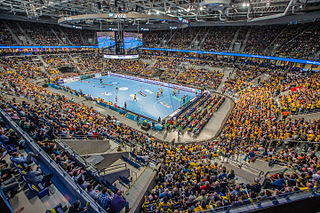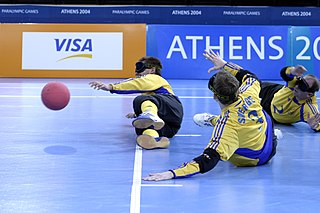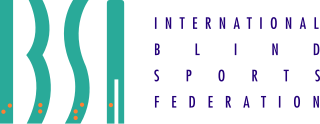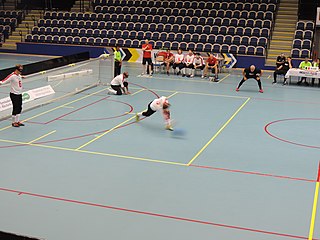
Handball is a team sport in which two teams of seven players each pass a ball using their hands with the aim of throwing it into the goal of the opposing team. A standard match consists of two periods of 30 minutes, and the team that scores more goals wins.

Korfball is a ball sport, with similarities to netball and basketball. It is played by two teams of eight players with four female players and four male players in each team. The objective is to throw a ball into a netless basket that is mounted on a 3.5 m high pole.

Goalball is a team sport designed specifically for athletes with a vision impairment. Participants compete in teams of three, and try to throw a ball that has bells embedded inside of it into the opponents' goal. The ball is thrown by hand and never kicked. Using ear-hand coordination, originating as a rehabilitation exercise, the sport has no able-bodied equivalent. Sighted athletes are also blindfolded when playing this sport.

Indoor hockey is an indoor variant of field hockey. It is similar to the outdoor game in that two teams compete to move a hard ball into the goal of the opposing side using hockey sticks. Indoor hockey is played on a smaller area and between smaller teams than field hockey and the sidelines are replaced by solid barriers from which the ball rebounds and remains in play.

The International Blind Sports Federation (IBSA) is a non-profit organisation founded 1981 in Paris, France. It was formerly known as the International Blind Sports Association. IBSA's mission is to promote the full integration of blind and partially-sighted people in society through sport and to encourage people with a visual impairment to take up and practise sports. IBSA is a full and founding member of the International Paralympic Committee (IPC).
Showdown is a sport for the blind and visually impaired which could be described as the blind community's answer to air hockey, or table tennis. It is growing very quickly around the world. It is also played by sighted players, but they are not allowed to participate in the International Blind Sports Federation (IBSA) tournaments. Showdown is widely spread in Europe, but it's also played in: Africa, Asia, North America, and South America. After the success of Showdown at the 1996 Atlanta Paralympics, representatives from more than thirty countries contacted the International Blind Sports Federation Showdown Subcommittee. They wanted information about equipment, blueprints, and rules so they could play this game in their country. Currently, the IBSA Showdown Sub-committee is encouraging regional and national Showdown Tournaments in an effort to have international championships which, hopefully, will lead to sanctioning by the Paralympics.
Germany women's national goalball team is the women's national team of Germany. Goalball is a team sport designed specifically for athletes with a vision impairment. The team takes part in international goalball competitions.

Great Britain women's national goalball team is the women's national team of Great Britain. Goalball is a team sport designed specifically for athletes with a vision impairment. It takes part in international goalball competitions.
Finland women's national goalball team is the women's national team of Finland. Goalball is a team sport designed specifically for athletes with a vision impairment. The team takes part in international competitions.

Sweden women's national goalball team is the women's national team of Sweden. Goalball is a team sport designed specifically for athletes with a vision impairment. The team takes part in international goalball competitions.
Spain women's national goalball team is the women's national team of Spain. Goalball is a team sport designed specifically for athletes with a vision impairment. The team takes part in international competitions.
Ukraine women's national goalball team is the women's national team of Ukraine. Goalball is a team sport designed specifically for athletes with a vision impairment. The team takes part in international competitions.

Belgium men's national goalball team is the men's national team of Belgium. Goalball is a team sport designed specifically for athletes with a vision impairment. The national team takes part in international competitions.
Italy men's national goalball team is the men's national team of Italy. Goalball is a team sport designed specifically for athletes with a vision impairment. The team takes part in international goalball competitions.

Russia women's national goalball team is the women's national team of Russia. It takes part in international goalball competitions. Goalball is a team sport designed specifically for athletes with a vision impairment.
Sevda Altunoluk is a Turkish Paralympian goalball player competing for Yenimahalle Belediyespor in Ankara. She is a member of the national team, and was named several times as Top goalscorer. In 2021 she was named as one of the BBC's 100 Women.

Sümeyye Özcan is a Turkish female middle distance runner and goalball player in the B1 class. She is a member of the national team.
Goalball in Cameroon is one of several sports available to people with vision impairments to participate in. It arrived late to the blind sports community in Cameroon, with torball arriving first. It has subsequently, been supported domestically by clubs such as Club for the Blind Youth of Cameroon (CJARC) and PROMHANDICAM Yaounde.
The IBSA Goalball World Championships is an international goalball tournament held every four years, since 1978, between Paralympic Games goalball tournaments. It is organised by the International Blind Sports Federation (IBSA) Goalball Subcommittee.
France women's national goalball team is the women's national team of France. Goalball is a team sport designed specifically for athletes with a vision impairment. The team takes part in international competitions.










